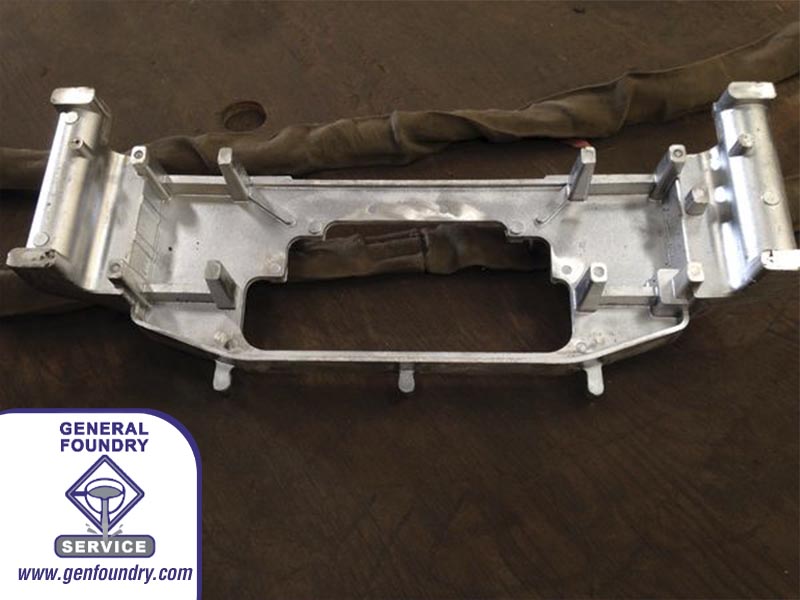
The permanent mold casting process, also known as gravity die casting or tilt pour casting, is a casting process used to create metal parts, components, and products with higher structural integrity, consistent dimensional accuracy, and a good surface finish. It is a type of metal casting that utilizes machined negative molds made from materials such as H-13 steel or cast iron. The molds are designed to withstand repeated use, hence the name “permanent mold.” Steel molds will yield roughly 25% more shots than the cast iron molds, 40,000+ vs 30,000+.
Permanent mold casting is similar to die casting in that it uses a metal mold or negative die. The process also shares some similarities with sand casting since molten metal is poured into a mold negative which is clamped shut until the material cools and solidifies into the desired part shape. The permanent mold process is the closest process to die casting General Foundry offers and is used to create geometries that require increased structural integrity and intermediate to higher production volumes with casting cost down opportunities (geometry driven).
What is the Permanent Mold Casting manufacturing process?
The Permanent Mold Casting process typically consists of:
- Mold Preparation: The permanent mold is made by machining or casting, then machining, a mold cavity with the desired shape. The molds are pre-heated two negative halves with hating already cut into them. The interior surfaces of the mold are coated with a refractory material or mold release agent aid in the easy removal of the casting and create consistent surface finish.
- Core Preparation: Cores create undercuts and hollow features. Shell or CO2 sand cores are also created at this stage if they will be needed and placed between the mold halves prior to pouring.
- Metal: The molten metal is poured into a pour basin (bowl), the machine tilts 90-degrees upright, and gravity pushes the metal through a gating system.
- Solidification: The molten metal cools and solidifies inside the mold, taking the shape of the cavity. Cooling can be accelerated using water-cooled mold sections or external cooling methods.
- Mold Opening and Ejection: After the metal has solidified, the mold is opened, and the casting is removed through injection pins. Mechanical methods or compressed air may be used to facilitate the ejection of the casting.
- Trimming and Finishing: The casting may undergo trimming and finishing operations to remove any excess material, improve surface quality, and achieve the final desired shape.
Why select this process for your parts?
Permanent Mold Casting utilizes gravity-induced pressure with the help of rapid solidification to produce fully functional castings that have increased mechanical properties and can be used for casting cost downs are intermediate and higher volume production.
Some of the advantages of selecting Permanent Mold Castings include (but are not limited to):
- Quicker solidification rate, tighter dendrite structure, and increased mechanical properties.
- As cast dimensional accuracy and repeatability.
- Lower labor costs and quicker cycle times.
- Consistent part definition and detail.
- Better as cast surface finish compared to sand.
- Ability to cast complex shapes with undercuts and hollow features, including thinner-walled sections.
What are some common industries and applications for Permanent Mold Castings?
Permanent Mold Casting is typically used for high-volume production of smaller parts with uniform wall thickness.
Some of the industries that commonly utilize Permanent Mold Castings include (but are not limited to):
- Automotive/engine,
- Agriculture,
- Commercial pumps,
- Marine,
- Power generation,
- Hydraulic,
- Oil and gas,
- and more.
How can General Foundry Service help you?
At General Foundry, we can create castings with increased structural integrity for numerous applications utilizing our Permanent Mold Casting process. We pour both aluminum and zinc-aluminum into the permanent mold process. We have the capabilities to produce the parts and components that you need with compressed lead times due to our in-house processes. Our metal casting experts will work with you to design and develop a permanent mold casting based on your unique specifications.
General Foundry Service offers true one-stop shopping. With our in-house pattern shop, machine shop, and five complementary casting processes, we specialize in machined, Class A, cosmetically coated aluminum castings. Contact us today for more information about our metal casting solutions or to get started on your next project.

